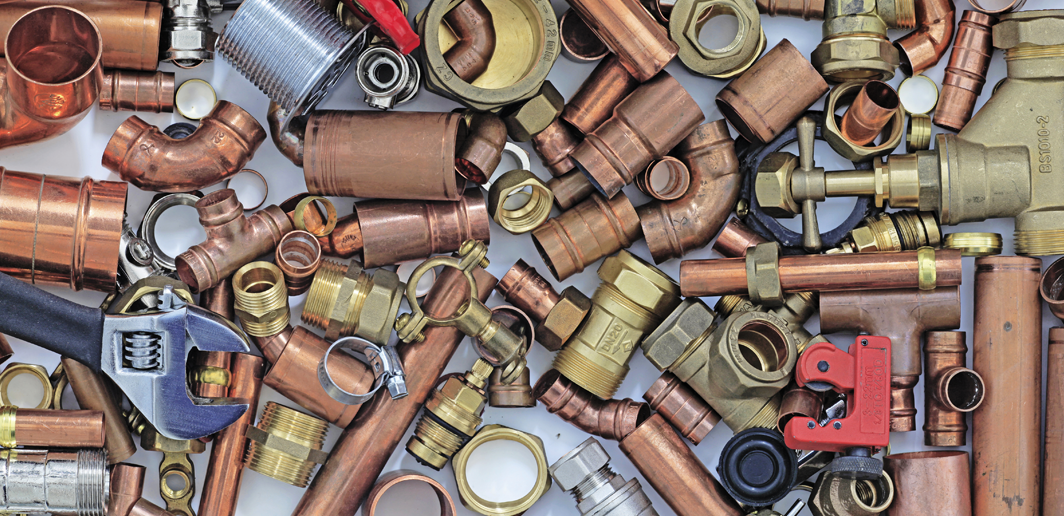1. All plumbing products sold, imported into and used in Australasia must hold WaterMark certification
WaterMark certification is the industry standard for plumbing products in Australia and is there to protect consumers - it guarantees a plumbing product is constructed to a defined quality and standard deemed safe, appropriate and acceptable for Australian use. A licensed plumber must install WaterMark certified products in their work.
Yet non-conforming plumbing products are available for sale in retail and trade stores across Australia, are imported into Australia and are used in Australian homes and buildings.
These non-conforming products are generally of a poorer quality and build and can pose significant risks to the health and safety of consumers because of flaws in their construction, capability and durability. They can also include hidden dangers such as extremely high levels of lead.
Compliant plumbing products sit side-by-side on the same retail shelves as non-compliant products, giving the consumer the choice of product without explaining the difference between them.
This is potentially misleading the consumer and short-changing them in terms of the quality and safety of the products they are purchasing.
In Queensland, under state legislation, plumbing products can’t be sold in retail or trade stores unless they hold WaterMark certification - Queensland is the only state or territory where this is the case.
We wish to support the introduction of a Watermark Certification program in New Zealand that aligns to Australia.
OUR CALL TO ACTION
- We want the Queensland retail model embraced and applied at a national level.
- In addition, we want to extend this model to make it illegal to import plumbing products that do not hold WaterMark certification into Australia and for it to be illegal to use plumbing products that do not hold WaterMark certification in Australian buildings of any type. This is to safeguard consumers and ensure the building industry delivers better and safer homes and buildings for everyone.
- As a first step, it should be compulsory for all Australian retailers to display WaterMark certification at point-of-sale to give consumers the information they need to make an informed choice.
- We wish to support the introduction of a Watermark Certification program in New Zealand that aligns to Australia.
2. Introduce stronger national legislation and defined processes to guarantee security of payment for construction industry contractors and sub-contractors
Plumbers, gasfitters and other trades generally work as contractors and sub-contractors in the construction industry and, as such, are down the project chain in terms of getting paid for the work and goods and services they provide.
Yet, like any other Australian business, they need cash flow to maintain their operations and are entitled to get paid appropriately and in a timely fashion for the work they do. It’s only fair.
This is why security of payment is such an important issue in our profession as it underpins the long-term viability of all plumbing and gasfitting businesses.
Existing state legislation and processes relating to security of payment vary but still leave contractors and sub-contractors vulnerable - they focus on protecting prompt payment and fair payment but offer no protection if a company above a contractor or sub-contractor goes out of business.
When things go wrong on a building construction project it’s common that the contractors and subcontractors get squeezed on payment or end up not getting paid at all. This is in part why almost 1,700 construction businesses went out of business in the last financial year.
Even under current state-based legislation, there are still too many occasions where buildings are constructed, on time and on budget, and yet, many years later, some contractors and sub-contractors are still to get paid.
This is unacceptable practice for any worker in Australia, and the construction industry employs one in 10 of Australia’s workers directly.
We need national legislation that ensures security of payment for contractors and sub-contractors. It must ensure any company collecting money on behalf of a contractor or sub-contractor must put this money aside and cannot spend it as they wish.
We also need a simple, quick, clearly defined process of recourse to enable contractors and sub-contractors to collect money they are owed in a timely way.
Recent construction industry reviews have recommended the introduction of cascading statutory trust accounts to ensure payment to contractors and sub-contractors and this must be closely examined.
OUR CALL TO ACTION
- The Australian Government should identify the best model to ensure security of payment for construction industry contractors and sub-contractors.
- The Australian Government should implement legislation at a national level to ensure consistency.
3. Introduce a Continuing Professional Development program and mandatory minimum four-year apprenticeships across the plumbing industry
Master Plumbers Australia strongly advocates for the introduction of a nationally consistent program of Continuing Professional Development (CPD) for plumbers and gasfitters, as exists in many other professions.
We believe accreditation and lifelong learning ensures the future standards of our profession and with it the health and safety of the community we serve.
The program should be tied to the renewal of a plumber’s licence to provide confidence in our profession’s ongoing capability.
Plumbing is regulated on a state/territory basis and the scope of plumbing work varies across jurisdictions, so a national CPD program needs flexibility to cater for these differences.
Master Plumbers Tasmania has partnered with the Tasmanian State Government to deliver a state CPD program for plumbers.
Master Plumbers associations in other states such as Victoria and Western Australia are already working together to develop voluntary CPD programs based on the Tasmanian approach. The federal government can support and encourage this national cooperative approach through advocacy in all jurisdictions.
As much of our profession is learnt on the job, we also recommend the introduction of a mandatory minimum four-year apprenticeship for all plumbers under the supervision of a qualified plumber.
OUR CALL TO ACTION
- Encouragement of a nationally consistent CPD program linked to the renewal of licensing for plumbers.
- Mandatory minimum four-year supervised apprenticeships for all plumbers before being eligible to apply for a licence.
4. Bring plumbing industry employment legislation into line with standard business practices
There are shortfalls in current employment legislation in Australia relating to redundancy in the plumbing industry which are unfair to those running plumbing and gasfitting businesses.
They fall short of standard business practice and are uncompetitive for our profession.
Under current minimum entitlements, a plumbing business is liable to pay redundancy under a very wide range of circumstances. Employers already do and should remain liable to pay for genuine redundancies, but the scope for these payments must be brought into line with standard business practice.
OUR CALL TO ACTION
- The Australian government should bring the whole of Section 18 of the Plumbing and Fire Sprinklers Award into line with the National Employment Scheme (NES).
5. Ensure that offsite constructed modules in the construction industry, commonly called pods, are certified by a licensed plumber if they involve plumbing works
The construction industry is evolving and one trend we have seen in recent years is the increasing use of pre-constructed modules (pods) on major building construction projects.
These ‘pods’ are self-contained units such as fully fitted bathroom or kitchen units that are put together offsite and then delivered to the construction site as one module, to be fitted as a single unit into the end building.
There are two problems here from a safety perspective:
- The ‘pod’ must include WaterMark certified plumbing products but if they are not assembled by a licensed plumber there is no guarantee these products have been correctly and safely put together. Currently these ‘pods’ bypass critical compliance testing that an in-situ construction would require for consumer safety.
- The ‘pods’ themselves are usually self-contained units, so a licensed plumber connecting them into the end building has no ability or line of sight to assess that the ‘pods’ do indeed include WaterMark certified plumbing products, and that these products have been assembled correctly within the unit.
- The installation of pipes, fittings and fixtures is plumbing and drainage work regardless of whether it is performed on or offsite.
OUR CALL TO ACTION
- That it be a legislated national requirement that all ‘pods’ involving plumbing works used on any building construction in Australia must be certified by a licensed plumber at the point of the pod’s construction.
- The current ability to certify complete ‘pods’ under WaterMark must be removed.
Master Plumbers and Mechanical Services Association of Australia
Across Australia and New Zealand, plumbing businesses face similar challenges. There are differences in regulation across state boundaries, but by and large plumbing and business operations remain constant - particularly for companies which work in multiple jurisdictions.
Master Plumbers associations are united and working together on the critical national issues which impact our respective members no matter where they are based.
We collectively will ensure that all parties wishing to influence the formation of governments are aware of our priorities for reform and improvement of the plumbing industry in Australia and New Zealand.
Peter Daly, CEO
Master Plumbers Australia comprises the Master Plumber associations of Victoria, Tasmania, Queensland, South Australia, Western Australia, ACT and the Northern Territory, as well as New Zealand. It develops, informs and represents the industry on national issues.

